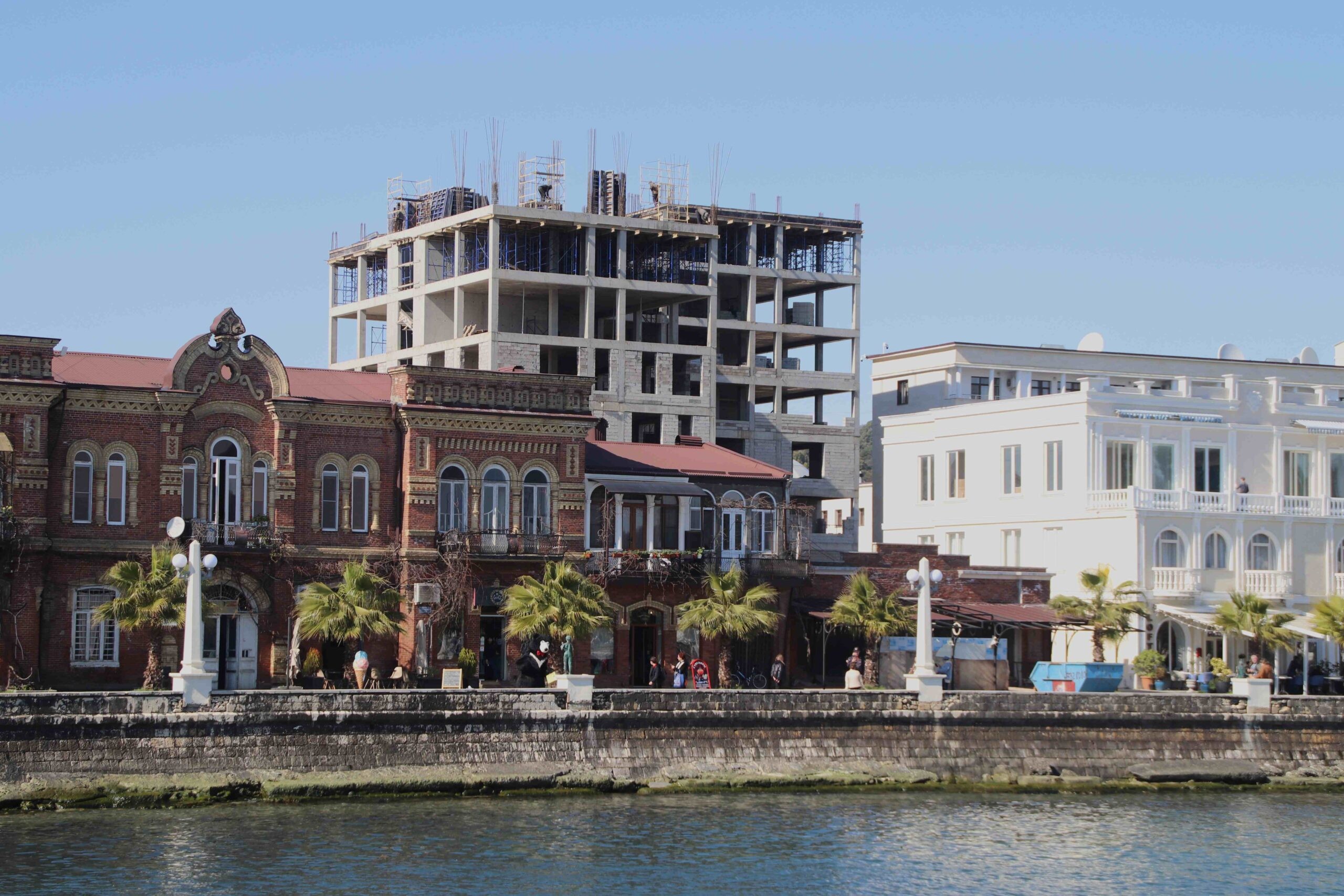
A conflict between the Mayor’s Office and City Assembly in Sukhumi (Sukhum) over construction laws in the city centre has escalated, as the Mayor’s Office has taken legal action against the assembly.
The city’s mayor, who is appointed by the central government, launched a lawsuit against the City Assembly, a council of elected representatives, over a long-running dispute regarding the construction of a multistorey building in central Sukhumi.
Activists have warned that if construction of the building is allowed to go ahead, it could jeopardise the nature of the city’s historic centre while opening Abkhazia up to a possible inflow of Russian citizens.
The building in question, whose construction began in mid-2022, violates a 2009 ruling by the City Assembly establishing that buildings in Sukhumi’s historic centre could not exceed 16 metres in height.
The legislation was brought to public attention in March by activists objecting to the construction, and an investigation launched on 17 March by the Prosecutor General.
[Read more: Activists rally against ‘monster’ building on Sukhumi seafront]
Later that month, the Prosecutor General’s Office concluded that the 2022 decision of the Mayor of Sukhumi, Beslan Eshba, to allow the construction of a multi-storey building on Kogonia Street was inconsistent with the decision of the Sukhumi City Assembly of 2009, and submitted a proposal to the Mayor’s Office to resolve the violation.
In response, the Mayor’s Office announced in late May that they would take the Sukhumi City Assembly to court over the lawfulness of the 2009 ruling.
Speaking at the first court hearing of the case on the evening of 20 June, Aslan Dochiya, a lawyer for the mayor’s office, stated the City Assembly did not have the authority to make such a decision, an argument he supported with a law ‘on measures to combat unauthorised construction in cities, working settlements, resorts, and summer house settlements’ dating to 22 May 1940.
Said Gezerdaa, a lawyer representing the City Assembly, stated in response that laws established during the Soviet Union could not regulate the actions and decisions of officials, as they did not provide for the existence of local governments, much less their rights and obligations.
While Dochiya maintained that the City Assembly did not have the right to overrule the mayor’s office or the city’s chief architect, Gezerdaa claimed that the City Assembly was a ‘controlling body’, without whose knowledge and permission no decisions can be made by the city authorities.
He added that the prohibition on the construction of buildings of more than five floors remains in force and necessary to ‘limit the actions of the administration’, as Sukhumi lacks ‘essential’ urban planning legislation.
‘There is also no urban planning code, no [city] master plan, and no building rules. This creates the conditions for making unreasonable and arbitrary decisions; decisions based solely on the opinion and position of specific officials’, said Gezerdaa.
Setting a precedent
The outcome of the case is seen by many as particularly significant in relation to a controversial draft law on the construction of apartments in Abkhazia.
Activists and opposition groups have raised concerns that the law will make it possible for people who are not Abkhazian citizens to buy property, and so gain residence. Some have directly connected the two cases, suggesting that a growing interest in construction in the city centre is connected to the draft law.
Russian officials have over the years pushed for Abkhazia to allow Russian citizens to move to and buy property in Abkhazia, a move the authorities and civil society there have resisted.
Public organisation AHATS on Wednesday stated that the law on apartments related to ‘issues of political sovereignty’, adding that its adoption would contribute to ‘the disruption of the demographic balance in Abkhazia’ and prompt domestic and foreign political tension.
They demanded that MPs reject the ‘anti-Abkhaz’ bill by 1 July, and threatened that if the bill were put to a vote, ordinary citizens would be left with no choice but to take to the streets to voice their objections to the measure.
The draft law has drawn widespread condemnation from across Abkhazia’s opposition, with its withdrawal a key demand of a major opposition protest in March.
Tuesday’s court hearing was the first to take place on the case of the lawfulness of the 2009 ruling, with the next hearing scheduled for 23 June.
Future hearings may call in Alkhas Ladaria, a former land-owner of some of the grounds where the multi-storey building is being built. Ladaria reportedly told activist group H-ara H-akalak (Our city) that, on applying for building permission on the site in 2012, he received the permits on the condition that the building not exceed 16 metres in height.
‘This fact is unconditional proof that some time ago, the department of architecture of the Sukhum administration knew about the resolution of the City Assembly on the permissible height in the central part of the city of 2009 and was guided by it in its work’, wrote the activists.
For ease of reading, we choose not to use qualifiers such as ‘de facto’, ‘unrecognised’, or ‘partially recognised’ when discussing institutions or political positions within Abkhazia, Nagorno-Karabakh, and South Ossetia. This does not imply a position on their status.









